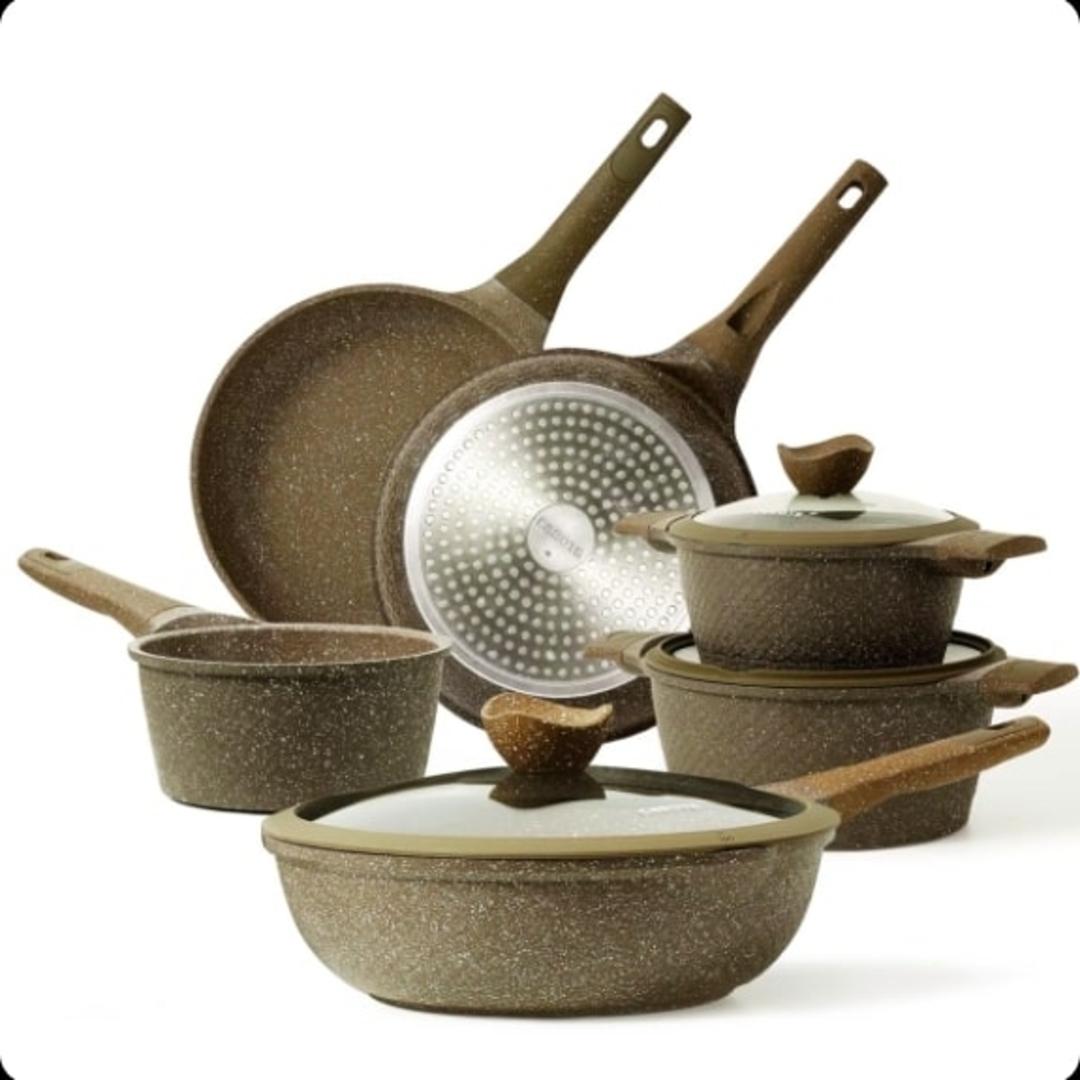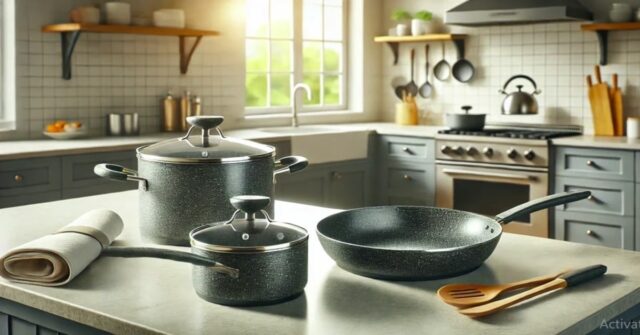Granite cookware is very popular for its non-stick properties, different color options, and affordability. But with its rise in demand, many people wonder, Is granite cookware safe to use? In this article, I’ll delve into what granite cookware is, its benefits, potential concerns, and how to use it safely in your kitchen.
What is Granite Cookware?
Although it’s called granite cookware, it doesn’t actually contain real granite. Instead, it typically consists of a metal core (usually aluminum or stainless steel) coated with a porcelain enamel or ceramic finish that mimics the look of granite. This coating provides the non-stick surface, making it ideal for cooking with minimal oil.
Is Granite Cookware Safe?
Granite cookware is generally safe to use, but its safety depends on several factors, like product quality, how you use it, etc. Here are some factors to consider:
Non-Toxic Coating
Most reputable brands of granite cookware use non-toxic, lead-free, and cadmium-free coatings. The enamel or ceramic coating used in granite cookware is free from harmful substances like PTFE, PFOA, and cadmium. And it is a safer option compared to some traditional nonstick pans. Always check the manufacturer’s specifications to ensure the cookware complies with safety standards.
No Harmful Fumes
Unlike traditional Teflon-coated pans, granite cookware does not release harmful fumes at high temperatures if it’s PFOA- and PTFE-free.
Chipping Risk
Over time, the nonstick coating on granite cookware may wear off, exposing the metal base. If the base is aluminum, prolonged exposure to acidic foods can lead to leaching of metals, which is a safety concern. To minimize this risk, avoid using metal spoons in cooking and abrasive cleaning tools.
High Heat Limitations
Granite cookware is generally not designed for extreme heat. Most granite cookware is safe for cooking at medium to high temperatures, but exceeding the recommended heat limit can damage the coating. Always check the manufacturer’s guidelines to ensure you’re not overheating your cookware.
Pros of Granite Cookware
Non-Stick Surface
Granite cookware’s smooth coating allows for effortless food release and easy cleaning.
Lightweight
Compared to cast iron or other heavy-duty pans, granite cookware is significantly lighter, making it easy to handle.
Aesthetic Appeal
The sleek, granite-like finish adds a touch of elegance to your kitchen.
PFOA-Free Options
Many modern granite cookware products are free from harmful chemicals like PFOA and PTFE, which are common in older non-stick cookware.
Cons of Granite Cookware
Less Durable
Less durable compared to other types of cookware, such as cast iron or stainless steel.
Requires Careful Maintenance
It requires careful handling to prevent chipping or scratching.
Limited Heat Tolerance
Limited heat tolerance compared to alternatives like stainless steel or cast iron.
Tips for Safely Using Granite Cookware

Avoid Metal Utensils
Use silicone, wood, or nylon spoons to prevent scratching the surface.
Cook at Moderate Temperatures
Use low to medium heat to avoid damaging the coating from overheating.
Hand Wash Only
Avoid the dishwasher, as high-water pressure can damage the surface. Avoid abrasive scrubbers to prolong the life of the nonstick surface.
Inspect Regularly
Check your cookware for any signs of wear and tear. Replace it if the coating starts to peel or chip.
FAQ
Does granite cookware contain actual granite?
No, granite cookware does not contain real granite. The name refers to the speckled appearance of the nonstick coating, which is usually made of porcelain enamel or ceramic.
Is granite cookware free from harmful chemicals like PTFE and PFOA?
Yes, most granite cookware is free from PTFE, PFOA, and other harmful chemicals, making it a safer option for nonstick cooking. Always check the product label to confirm.
Can granite cookware handle high temperatures?
Granite cookware can typically handle medium to high temperatures, but it’s best not to exceed the manufacturer’s recommended heat limit to prevent damage to the coating.
Is granite cookware safe for cooking acidic foods?
Yes, as long as the nonstick coating is intact, granite cookware is safe for cooking acidic foods. However, if the coating is damaged, the metal base (usually aluminum) may react with acidic ingredients.
Can I use metal utensils with granite cookware?
It’s not recommended. The nonstick coating can be scratched or chipped by metal utensils. Silicone, wooden, or plastic utensils are safer choices.
Is granite cookware dishwasher safe?
While some granite cookware is marked as dishwasher safe, handwashing is usually advised to protect the coating and make the cookware last longer.
What should I do if the coating on my granite cookware chips or peels?
If the coating is chipped or peeling, it’s best to stop using the cookware. Exposed metal may leach into food, posing a safety risk.
Is granite cookware durable?
Granite cookware is reasonably durable with proper care, but it’s not as long-lasting as stainless steel or cast iron. Its enamel coating requires careful handling to prevent damage.
Can granite cookware be used on induction stovetops?
It depends on the cookware. Some granite cookware is compatible with induction stovetops if it has a magnetic base. Check the product specifications to confirm.
How does granite cookware compare to other nonstick options?
Granite cookware is often considered safer than traditional nonstick pans because it’s free of PTFE and PFOA. However, its durability and heat tolerance may be lower than other nonstick options like hard-anodized aluminum or ceramic.



